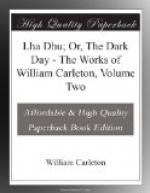Here comes another party, fewer in point of number than those we have shown you; a young man, a middle-aged woman, and her two daughters—one grown,the other only about fifteen. Who is—ah!—it is not necessary to inquire. Alley Bawn Murray! Gentle reader bow with heartfelt respect to humble beauty and virtue! She is that widow’s daughter, the pride of the parish, and the beloved of all who can appreciate goodness, affection, and filial piety. The child accompanying them is her sister, and that fine, manly, well-built, handsome youth is even now pledged to the modest and beautiful girl. He is the son of a wealthy farmer, some time dead; but in purity, in truth, and an humble sense of religion, their hearts are each rich and each equal.
Alas! alas! that it should be so! but we cannot control the inscrutable designs of Heaven. The spirit of our narrative must change, and our tale can henceforth breathe nothing but what is as mournful as it is true. There they pass into that public-house, true-hearted and attached; unconscious, too, poor things, of the almost present calamity that is soon to wither that noble boy and his beautiful betrothed. Their history, up to the period of their entering the public-house, is very brief and simple. Felix O’Donnell was the son of a farmer, as we have said, sufficiently extensive and industrious to be wealthy, without possessing any of the vulgar pride which rude independence frequently engrafts upon the ignorant and narrow-hearted. His family consisted of two sons and a daughter—Maura, the last-named, being the eldest, and Felix by several years the junior of his brother Hugh. Between the two brothers there was in many things a marked contrast of character, whilst in others there might be said to exist a striking similarity. Hugh was a dark-brown, fiery man when opposed, though in general quiet and inoffensive. His passions blazed out with fury for a moment, and only for a moment; for no sooner had he been borne by their vehemence into the commission of an error, that he became quickly alive to the promptings of a heart naturally affectionate and kind. In money transactions he had the character of being a hard man; yet were there many in the parish who could declare that they found him liberal and considerate. The truth was, that he estimated money at more than its just value, without absolutely giving up his heart to its influence. When a




